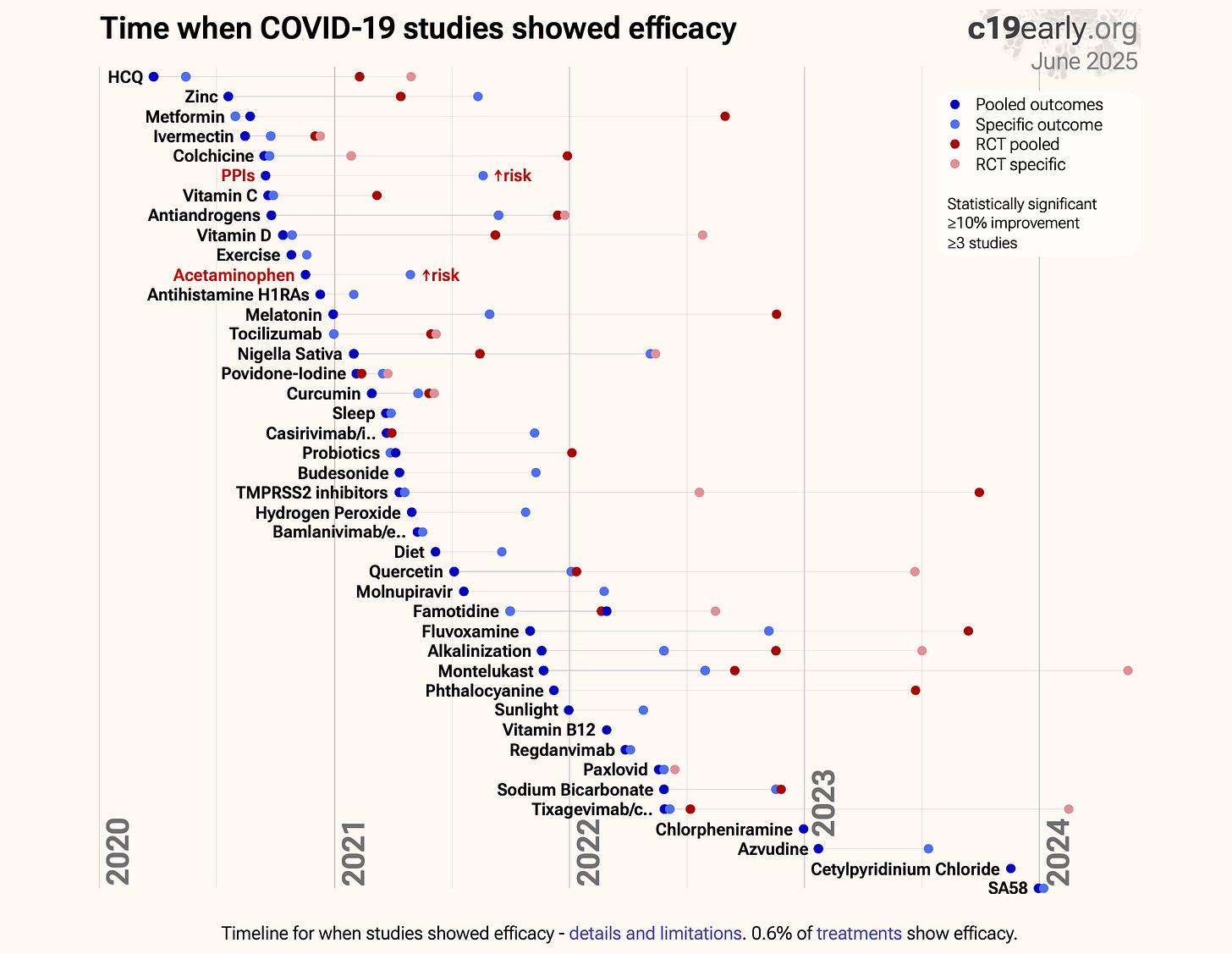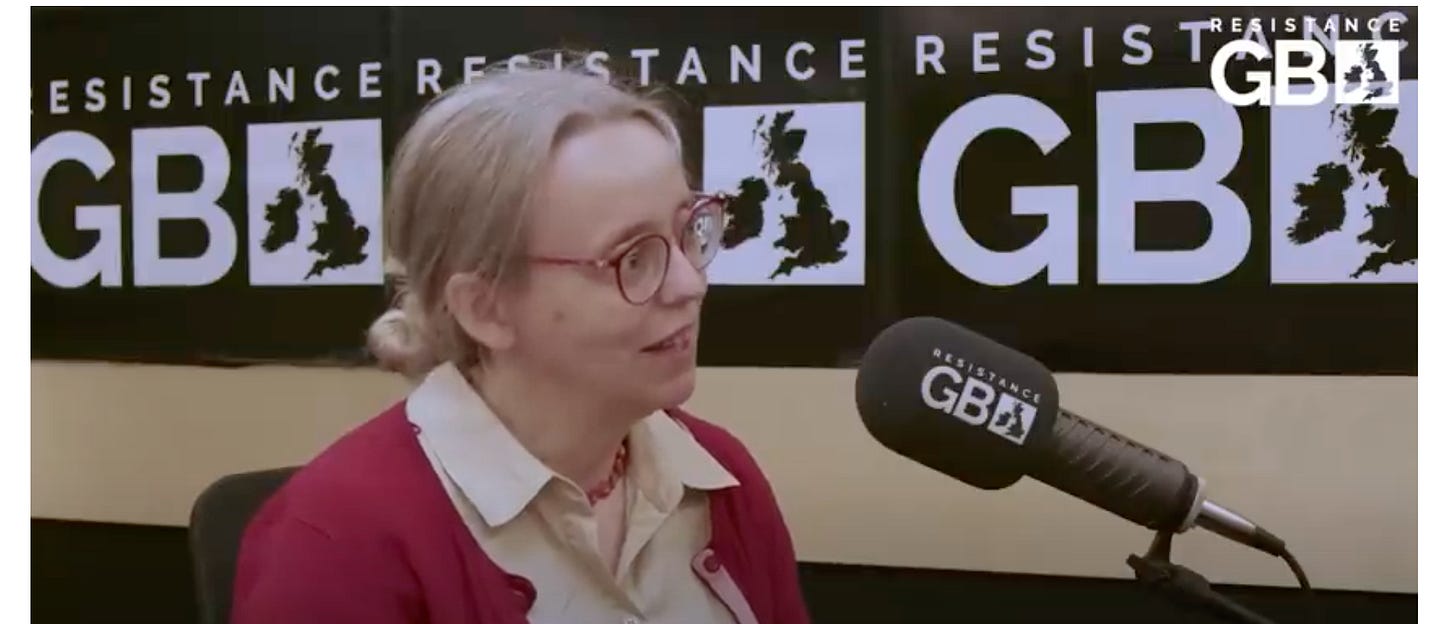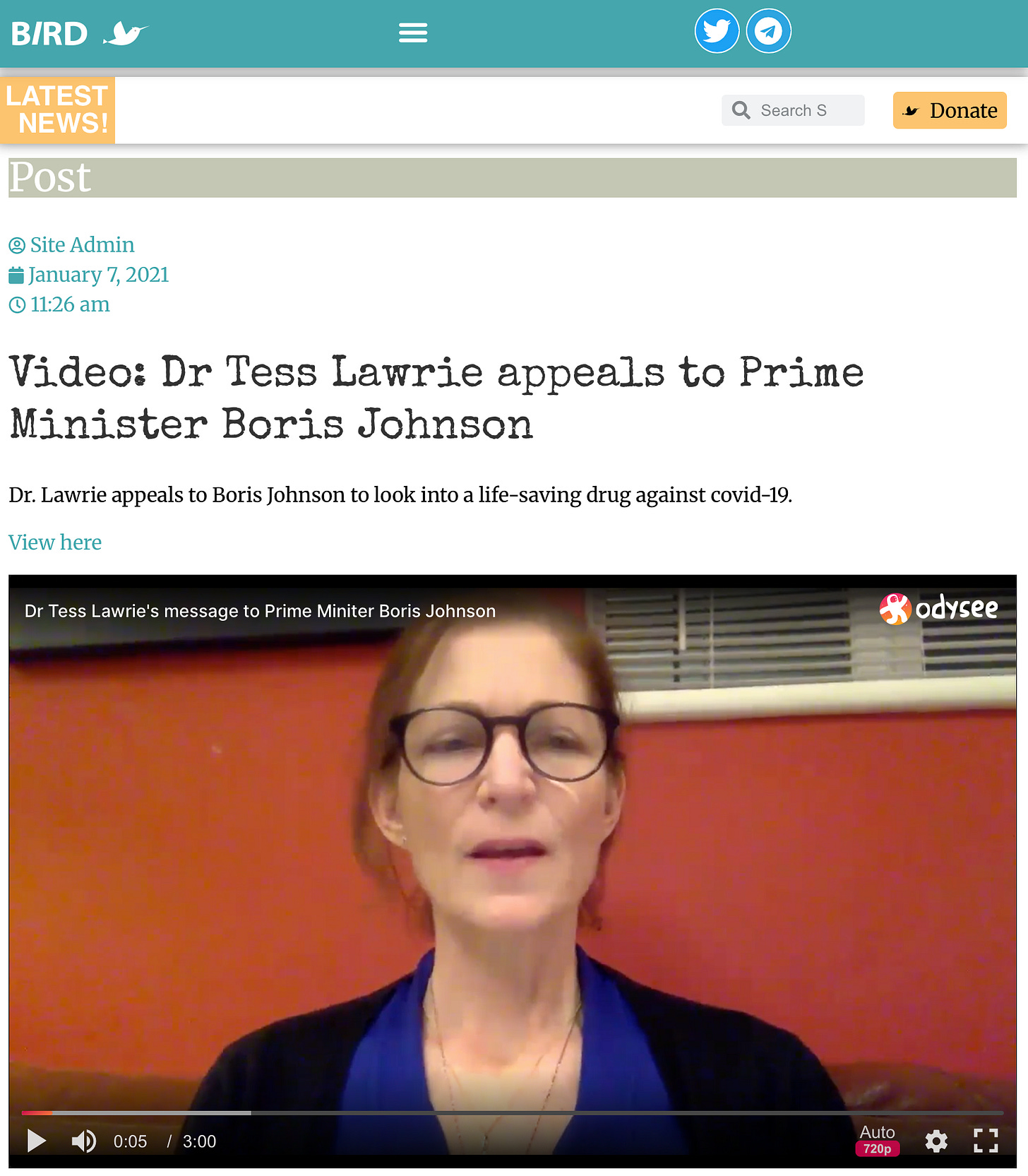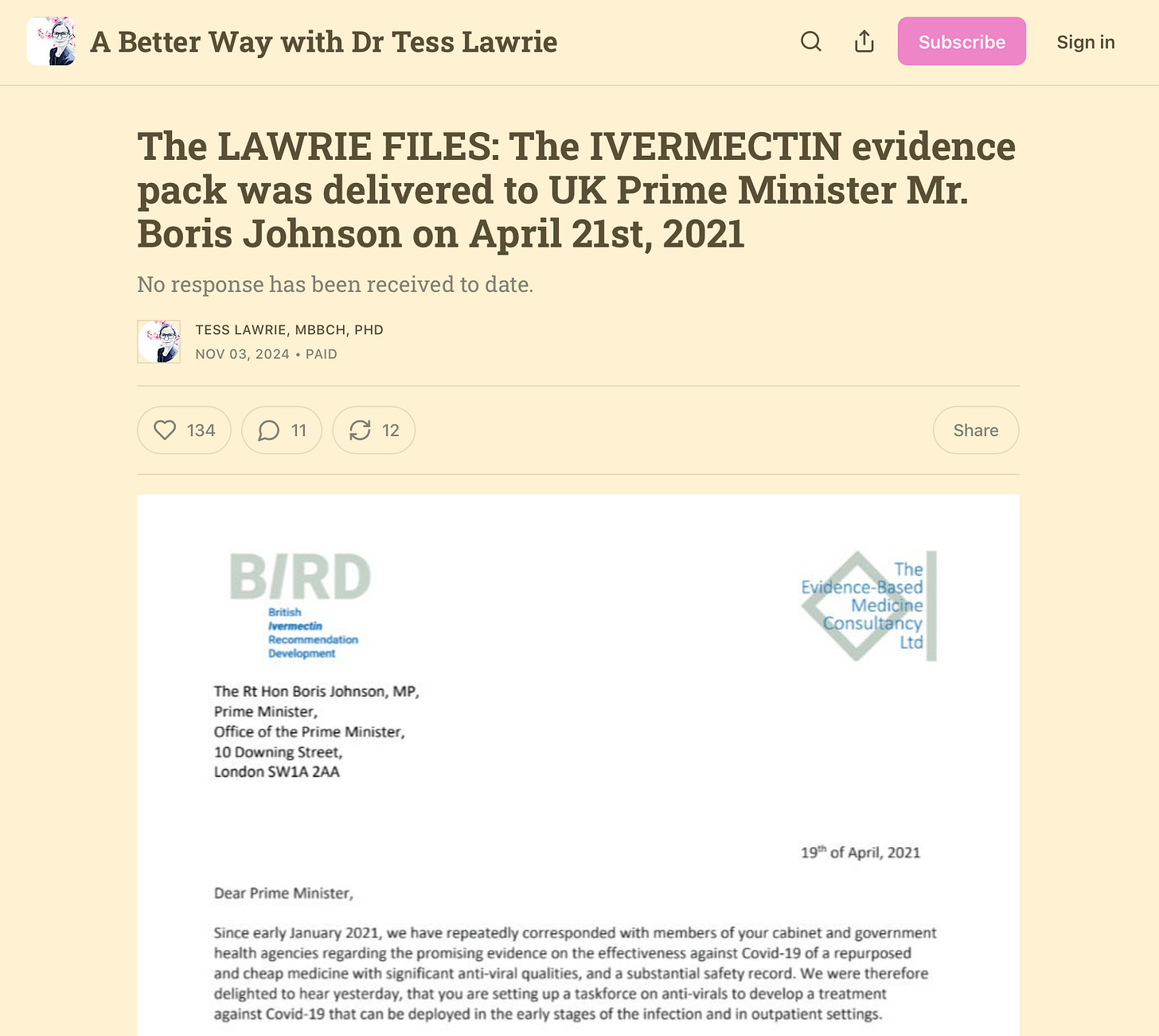A pathologist's perspective (part 1 of 3)
Dr Clare Craig on medical ethics and damage caused during the covid era
Dear Church Leaders (and everyone else)
This is part 1 of a series of three posts featuring a recent podcast with pathologist Dr Clare Craig, who is among those best placed to speak about the covid era from an evidence-based perspective. The interviewer is Will Coleshill — freedom journalist and founder/editor of Resistance GB.1
After brief introductory comments on the alternative media and medical ethics, the main focus is on damage caused during the covid era (excluding damage from the so-called covid vaccines, which will be featured in part 2).
Topics include: the context of the swine flu “pandemic” of 2009; the reasons for excess mortality in 2020; “Do-not-resuscitate” orders; the lack of prescriptions for antibiotics; ventilators; midazolam and morphine; vitamin D; hydroxychloroquine; and ivermectin.
If you want a shorter version, just read the parts in bold.
Introduction
[1:43]
[Will Coleshill] Clare, do you want to introduce yourself…
[Clare Craig] I’m Dr Clare Craig. I’m a pathologist. And I’ve been co-chair of the HART group since 2021 — that’s the Health Advisory and Recovery Team — and we are a bunch of… professionals and experts in all sorts of different areas who’ve been talking around covid issues… and other medical freedom issues.
[Coleshill] So it’s all coming out then?
[Craig] It is. It’s incredibly slow, because we don’t have any backup at all… never have had… from the mainstream media. And so we’re entirely dependent on people like you… independent media… to report what the actual evidence has been saying and has said all along. But because the evidence hasn’t changed, the message is finally getting through…
There was an article in The Times yesterday where they were talking about focus groups. And the guy who they were interviewing was complaining how focus groups keep bringing up covid when they’re meant to be talking about something else. And they said that 37% of the public now think that the “pandemic” was an attempt… from the government to gain more control. So… the messages do get through… and… it does feel a like a little bit of a win, even though it is painfully slow.
[Coleshill] So we’ve got over a third of the population now… Why do you think people are waking up. What is it? Is it just speaking to friends. Is it seeing people around them. Is it the alternative media?
[Craig] I think the alternative media has been really, really important. But I think people don’t know whether to trust it. And so friends absolutely are important, because people do trust their friends and… you wouldn’t start listening to alternative media without somebody you trusted talking about something first. But I think ultimately it’s none of that. Ultimately it’s the evidence. If you can point people to facts and show them why [those facts] are true, that’s what gets people to believe them. And the mainstream media have lied so much and contradicted themselves so much that people have lost trust in those particular topics because [what they are saying is] clearly not true.
Medical ethics
[3:58]
[Coleshill] So if you had to pitch what you’re trying to expose to someone who was completely alien to it, or maybe they’ve heard something… what would your pitch be? What would you say to them as the headlines?
[Craig] The headlines for me are: during the covid period, foundational medical ethical principles that we have based Western philosophy on and… medicine on for generations… were utterly disregarded, along with civil liberties in a manner that you cannot ignore. You can’t one day say, “This doesn’t matter. We don’t have to worry about informed consent. We can ignore bodily autonomy for now and then pretend that that precedent hasn’t been set. You have to look back and say, “That happened. That was wrong. And we’re never going to let that happen again.” And that’s what we’re fighting for… to get to that point. And of course the first step in that process is to get people to recognise what happened. And we’re still… there at the moment….
[Coleshill] What were the consequences of what actually happened?
[Craig] In the societal structures that we have, we give up all sorts of power in order to live in a civilisation. So you say, “Okay… there’s certain things I’m not going to do, like break laws, because I want to live in a nation that has a legal structure that works, and that has criminal law… and… that will be beneficial to me. And I’m not going to have complete freedom over what I do because I want my community and my friends to have a set of rules that we abide by so that we can look after each other.” That’s how societies work…
[Coleshill] You can’t drive at 150 mph down a residential road…
[Craig] Right… So you have these rules and we agree to abide by these rules. But where that encroachment has always stopped in the past was at the level of our bodies. The thing that you do have ultimate power over and that you do get to choose about is what happens to you as a person… to your individual self. And so any discussion with a doctor, no matter what the doctor’s opinion was… ultimately, it was your choice whether you would accept or deny a treatment based on the advice that you were given. And that’s incredibly important… because we ought to be able to refuse treatments even if they work, because we ought to be allowed to decide what’s best for us, because we’re the only person that understands our own needs. And so doctors need to respect that. They need to say, “Okay… I think I would do this in your shoes, but if you want to do something different that’s fine.”
And [during the covid era] that was ended. And it was ended in such a way that it wasn’t just the doctors saying, “I’m going to do this to your body.” It was coming from government. We… ended up with centralised bureaucratic testing regimes for medicine and centralised prescription of vaccines for an entire population, not on an individual level. And so you’ve ultimately come to a point where the government has said, “I’m going to decide what goes into your body.” And that’s very, very problematic.
And it would be problematic even if the intervention were genuinely safe and effective.
[Coleshill] Isn’t the government looking out for us…?
[Craig] [Sighs] In some ways… One of the most frightening things about it is that there are absolutely people within the government, and absolutely people within the bureaucracies around the government, who have this honestly-held belief that they were doing something for a greater good. And the fact that they believed that is what made them so zealous and made it so frightening, because they thought they were on the side of good. And that that gave them some kind of freedom to go to extremes.
This section from C. S. Lewis’ God in the Dock springs to mind (emphasis added):
My contention is that good men (not bad men) consistently acting upon that position [imposing “the good”] would act as cruelly and unjustly as the greatest tyrants. They might in some respects act even worse. Of all tyrannies, a tyranny sincerely exercised for the good of its victims may be the most oppressive. It would be better to live under of robber barons than under omnipotent moral busybodies. The robber barons cruelty may sometimes sleep, his cupidity may at some points be satiated; but those who torment us for their own good will torment us without end for they do so with the approval of their own conscience. They may be more likely to go to heaven yet at the same time likely to make a Hell of earth. This very kindness stings with intolerable insult. To be “cured” against one’s will and cured of states which we may not regard as disease is to be put on the level of those who have not yet reached the age of reason or those who never will; to be classed with infants, imbeciles, and domestic animals.[Craig] And that needs to be pulled back from… the idea of a greater good… Inherent in that phrase is the idea that there is some sacrifice. Somebody, somewhere along the line… some minority… has been sacrificed for a greater good. And that’s not the philosophy that Western civilisation was built on. Western civilisation was built on a philosophy of each individual [having] divinity within them… they are to be respected. And if you start… from a philosophical base of “Individuals are unique and to be respected”, you do not end up [with] “I’m doing something for the greater good and I’m going to impose this on your body”
[Coleshill] I think it was Ayn Rand who said the greatest minority of all is the individual…
Here is that quotation:
The smallest minority on earth is the individual. Those who deny individual rights cannot claim to be defenders of minorities.[Craig] Yes… It’s interesting philosophically that… most people in this country… like the idea of “I’m standing up for the underdog… I want to support this small group because they are a minority, and therefore they need to be heard… their voices need to be represented.” And then you shrink that minority… [there] comes a point where you’ve lost people… I don’t know why. Why should a smaller minority have less of a voice [or a right] than a larger minority? You’ve inverted your philosophy. If you really want to go for the underdog, the ultimate underdog is the individual.
Damage caused during the covid era
[9:29]
The context of the swine flu “pandemic” of 2009
[Coleshill] Can you explain the damage… You’ve said there are four different types of covid deaths…?
[Craig] [Let’s start] with what covid was… We started this interview with me saying something potentially controversial about “pandemic” in inverted commas… The reason I said that is because the whole idea of a pandemic changed… Not so long ago it had a meaning that the public generally think of with that word. It’s a frightening word, isn’t it… and it used to mean that there was some disease that was spreading globally that would cause immense illness… you might have a third or half of the population all sick at the same time… immense disruption from illness and large numbers of deaths in the young. That was the critical part of the definition of a pandemic.
And that definition got changed in 2009 by the WHO [see e.g. p25-26 here], just before the swine flu “pandemic” was announced… very conveniently… And the swine flu pandemic was not a pandemic by any definition really. It didn’t even kill old people. It was just any old flu in terms of the numbers of deaths. But it was used to massively sell vaccines. People generally don’t know that story, but in the UK we bought 132 million doses of swine flu vaccine, and we also spent a whole load of money on treatments including Tamiflu which not only didn’t work but caused harm…
It was the same playbook as what we saw in 2020. And I think… some people became aware of [the 2009 swine flu “pandemic”] having happened and then they just thought, “Well, that was terrible” but didn’t foresee that that might happen all over again. And then in 2020 it happened at scale, but it was the same story… In terms of the virus… we absolutely saw excess mortality, and that excess mortality came in waves. That’s undeniable. But the point is that there are a number of reasons why that happened that never get addressed.
For context, according to the UK’s Office for National Statistics, before lockdown was announced on 23rd March, the numbers of recorded deaths were at or below normal levels, despite covid having reportedly been circulating since the end of January:
The reasons for excess mortality in 2020
[Craig] First of all, at the end of February everybody was told [that] if they had a cough or a fever they were to isolate at home. And at that point in time 11% of the population had a cough or fever… they were doing surveys… you could tell… which meant [a proportion] of our ambulance and emergency staff went home. Now that comes with a mortality rate…
And then around the same time… somebody drew up this plan for [an] ultimate worst-case scenario crisis situation… how would they ration healthcare if the crazy doom-mongerers were right. And this plan was circulated on NHS headed paper… as a consultation document. But when people received it, with the NHS logo on it, they thought it was to be enacted. And as a result of that… there were GPs who did blanket do-not-resuscitate orders for everyone on their list who had a learning disability, for example, or everyone on their list who was over the age of 65. And, at the same time, in hospitals, patients over the age of 65… or whatever… people seem to pick different criteria… they were also given do-not-resuscitate orders…
“Do-not-resuscitate” orders
[Coleshill] So just leave them to die, even if they’d be perfectly fine… leave them to die as if it’s some warzone…
[Craig] Actually yes and no. No, in that that’s not what a do-not-resuscitate order used to mean. [It] used to mean, “Give me all the treatments… do everything you can to make me better, but, should my heart stop, don’t resuscitate me.” That’s what it means and that’s how people are consented into signing that that’s what they want. And in a lot of cases it makes perfect sense because resuscitation is not brilliant, to be honest. It’s worth it because it works sometimes, but it fails most of the time. So 90% of the [time] you’re dead anyway. And then, in the small fraction of people who are going to recover, having been resuscitated, a good chunk of them end up on intensive care… [which] is not a place that people survive if they’re already frail. So you’re prolonging a death in a really quite unpleasant, undignified way. And so it makes sense, if you are frail, to say, “Give me all the treatments. Try and make me better, but I don’t want [resuscitation].”
[But] during covid the hospitals had blanket policies that they were not going to admit people who had do-not-resuscitate orders, so it went from “Don’t resuscitate me but treat me” to “All health care is being denied to these people”. And so obviously that comes a mortality rate. And one of the factors in that is that people with learning difficulties had six times the mortality rate of other people. Now respiratory viruses do not know your mental capacity…. you will be infected[at just the same rate, and your physical health is fine. There should be no difference in mortality rate for people with learning difficulties. But there was this marked difference because of how they were treated by other people. And that then was used to say, “Oh well, people with learning difficulties are at really high risk. We’d better jab them.” And that argument is still being used… that they “need to be vaccinated”… when actually their mortality rate was entirely down to policies… nothing to do with the virus…
I am reminded of this post:
[Interviewer] So they left people with mental disabilities to die, denying them health care…
[Craig] Yes. That’s what happened... Shortly after that, there were consultants in intensive care who wrote in the BMJ… in… summer 2020… the spring wave had happened [at this point]… to say, “We got this wrong. We got this terribly wrong. There were a lot of people who could have benefited from intensive care with a covid diagnosis who were denied treatment because of these rationing policies… and who died.” The reality is that intensive care for covid was there to benefit people who were being denied it… I could have got on to intensive care [but] I was never going to need intensive care for covid... So… the very people who needed it were the ones who were denied it. [And] of course that comes with the mortality rate… That’s the problem. We’ve got all of these policies that were going to create more deaths.
The lack of prescriptions for antibiotics
[Craig] And one of the policies was around what happened if you were sick… at all actually. [Normally] if you’ve got someone who’s sick with a cough and a fever and it’s getting worse, they’ll call their doctor and say “I’m sick.” And in the past… pre-2020… that doctor would assess them for pneumonia. And if they thought they had a pneumonia in the community they would be given… three tablets of antibiotics. And then, should they get sick, they’d go to hospital. But early on in the illness they’d be treated for pneumonia…
And that was true whether or not the pneumonia was caused by a virus. And it was beneficial whether or not the pneumonia was caused by a virus, because viral pneumonias, when they’re problematic it’s often because you’ve got bacterial infection on top. But also, the antibiotics themselves have some antiviral properties and anti-inflammatory properties. So you’re not only preventing a bacterial pneumonia. You’re also treating the viral pneumonia.
And overnight those treatments stopped. You can look at the prescription of antibiotics over the course of [the] covid [era], and instead of [the numbers of prescriptions] going up during a “pandemic” — which is what all of the pandemic plans predicted… an said, “You have to stockpile antibiotics for these viral pneumonias — they went down.
[Coleshill] How much?
[Craig] Oh, significantly… really marked. I can’t put a number on it from the top of my head, but there was a marked drop in [the number of prescriptions of] antibiotics.
[Coleshill] It should have doubled… tripled…
[Craig] Exactly.
[Coleshill] It halved, or something like that…
Treatment with antibiotics stopped because of covid protocols such as NG1632 — COVID-19 rapid guideline: managing symptoms (including at the end of life) in the community.
Here is the data from OpenPrescribing, which shows NHS prescriptions in England:
In contrast to the peaks in the winters of 2019/2020, 2021/2022 and 2022/2023 (and to a lesser extent 2023/2024), the number of prescriptions for antibacterials (antibiotics) was remarkably low during Spring 2020 (the “height of the pandemic”) and Winter 2020/2021.
I am reminded of the experience of children’s author Michael Rosen, discussed here:
[Craig] Yes. And so obviously, if you go to any situation where there’s no virus spreading, and you stop treating people for pneumonias in the community… and in hospital… people were being denied antibiotics even when they went to hospital… people in intensive care were being denied antibiotics…. It was madness. And so of course those people were more at risk of dying. And a lot of them died. And they died “of covid”… because they got a positive test result.
A positive result with PCR testing.
For context, its Nobel Prize-winning inventor Kary Mullis stated:
with PCR... you can find almost anything in anybodyMullis died in August 2019.
[Craig] But these are people who were not necessarily going to die… People have this idea that this wave of excess deaths was because of a virus attacking… and causing inevitable deaths because it was such a scary virus. And that’s simply not true. If you take apart all of the policies that we had in place, then you start to reduce down that mortality rate to what actually would have happened if we’d done nothing.
[Coleshill] So it’s 10,000 that this policy killed… 10,000 another policy… 10,000 another policy. And it stacks up to… 100,000… 150,000… That’s the difference?
[Craig] Yes. And even with all of those policy-induced deaths, the actual mortality rate of that spike in Spring 2021 and that spike in 2020… the two big waves… the mortality rate per 100,000 population was the same as we’ve seen in previous years with influenza… 1999, 2000, 1989, 1991.
Relevant data can be found here in a reply to a Freedom of Information request to the UK’s Office for National Statistics (ONS). The column on the right-hand side is age-standardised:
I am reminded that, in 2018, the ONS reported that during the 2017 to 2018 winter period there were an estimated 50,100 excess winter deaths in England and Wales:
But I don’t recall hearing any people say we should behave substantially differently from usual.
[Craig] We’ve had these in the past. The timing was weird. Spring 2020 was a weird timing for such a wave, but it’s not unheard of… But the size was actually within the bounds of what we’ve already seen, even with all those policy deaths. So the reaction was completely disproportionate to what was going on and…
I’m all for saving lives… I’m not dismissing the fact that people died. People did die, and some people may well have died without any of those policies, because viruses kill people every year — or, rather, people die every year and are testing positive for virus and we say that that’s what it is…
So I’m not saying that you could prevent all of those deaths either. I’m just saying that the way it’s been measured is incredibly biased, and has given a very distorted view of this frightening peak of death which actually was a similar size peak to death waves we’ve had in the past [and was] largely deaths from policy.
Ventilators
[Coleshill] So what other policy choices killed people? What about the midazolam? The ventilators…?
[Craig] The ventilators question is an important one… In 2020 there was… I think it originated in China… this idea that you had to ventilate early. And… it wasn’t completely baseless. People who had covid had sudden oxygen drops that were probably exaggerated by everybody wearing oxometers all the time and looking at… the numbers. People were treating numbers not patients, which is a dangerous thing to do.
So that was part of the problem, but I think there was some truth in it because this virus [more] than other viruses put a pause on the immune system. And then the immune system would be busy taking aim at virally infected cells, but the signal to fire was delayed… then a lot of cells die at once and you get that cytokine storm through the blood that damages other organs. Snd you get damage in the lung which drops your oxygen levels.
So the doctors were all very frightened of the sudden oxygen level drops, and we’re putting people onto ventilators before that happened, in a way that was extreme. So you had people who were being told, “We’ve got to go and ventilate you now.” And they’re like, “Can I just say goodbye to my wife?” And were having phone calls and speaking calmly in full sentences before going off and being intubated. And that never ever happens [usually]… the choice to ventilate a patient is normally when they’re already very, very sick and they certainly can’t sit up and chat.
[Coleshill] That’s when they can’t breathe for themselves… So can I just clarify… a ventilator is where they put the tube down the throat…
[Craig] Yes… either down the throat, or in a tracheostomy through the neck so that you’re not damaging vocal cords…
[Coleshill] But there are also ways of providing oxygen where you simply have a little plastic mask and it just generally wafts oxygen in your face and you breathe in some pure oxygen coming out a tank… A lot of people with COPD [chronic obstructive pulmonary disorder, i.e. respiratory illness] will have a mask. And when they need it they’ll go… Or you can have a low level of oxygen… just running constantly pure oxygen coming through to increase the oxygen supply for that person… Why weren’t they doing that?
[Craig] There’s two answers to that. One is that there was this great fear among the medical staff of spreading and catching this disease. And the WHO and the NHS and others were saying that there was a risk of aerosols from [the] breathing apparatus. So if you can get a tube in someone, and their breathing is all done in an enclosed system, you’re “safe”… [And] doctors have been interviewed saying that felt very wrong… to be prioritising [their] needs over what was best for the patients.
The other answer is in terms of just how much oxygen was being used… Those CPAP [continuous positive airway pressure] high pressure oxygen machines use a lot of oxygen. So they were rationing the oxygen by using ventilators as well.
But what was key was that, by Summer 2020, the evidence was out that… ventilation had killed people… The classic papers from New York… the numbers… were dramatic… the mortality rate had been 90% of people on ventilators. So… what’s the point? You’re meant to be saving lives and 90% of them are dead. And that was not happening elsewhere. It did not happen with other diseases…
[Coleshill] And when people were left without ventilators they had a more-than-10% chance of survival…
[Craig] They did. So what was key is that, in Summer 2020, they admitted this was wrong, and they said, “Actually, there are better ways that will save more lives.” And that… became protocol everywhere. So yes, people did die from being over-ventilated, but the numbers were quite small. For example, in the UK, for the whole of 2020, 10,000 people ended up on intensive care with a covid diagnosis. So the total numbers in terms of the excess mortality… ventilation was not what caused the big peak.
Midazolam and morphine
[Craig] And then we were going to move on to midazolam and morphine… [Both] are both really effective drugs, and I would hate to see them completely demonised because I can see a future where I might want one…
Midazolam is used all the time in endoscopy suites when people [are] having colonoscopies or gastroscopies… because it takes away the anxiety… it relaxes people… it works very well at doing that. And it’s also used in palliative care for the same reasons. And morphine… it’s the best pain reliever that we have, and that also has a relaxant effect.
And the evidence base that we have for the use of those two drugs in palliative care shows that, when you give them at the right dosages, it doesn’t accelerate death in cancer patients. They have looked at that question and… I can totally see a scenario where people that I love… or myself… I would want that kind of palliative care at the end of life.
Now the trouble is… with covid… first of all people were terrified witless with all the propaganda. And that included medical staff being terrified. And so the idea that, if you were over a certain age, this was a death sentence had permeated even though it wasn’t true. In reality even the oldest age groups at the worst point of the disease and with all of those deadly policies had an 80% survival [rate], so it was never a death sentence.
Chris Whitty, the Chief Medical Officer for England, when taking questions from a UK Members of Parliament in early March 2020, stated that:
The great majority of people will survive this [covid] even if they are in their 80s[Craig] But if it is a death sentence then you would think, “Well, I want to keep this person comfortable at the end of their life.” And these drugs were given… But both of those drugs suppress respiration. And we don’t have an evidence base… for when someone is sick with an acute respiratory infection and are dependent on their drive to breathe to survive… in giving those drugs.
Having said that, there was one paper that showed that, when those drugs were given in some covid patients, it had the effect of allowing them to breathe more deeply. So… if you’re in a panic and you start breathing very superficially, you could see how just being calmed down can cause you to breathe more effectively. So that’s the counterargument… that [midazolam and morphine] helped people to breathe more effectively. But I don’t think that was the only circumstance that they were given in.
There came a point where there were protocols that said, “If you deteriorate then there’s a binary choice between going off to intensive care and being ventilated, or these drugs.” You’re like, “Well, hang on a minute, where’s the third way?!” Where’s the “I’m not fit for intensive care, but I might get better… and so I don’t want to be on an end of life pathway.”
[Coleshill] Or all the other treatments that were available…
See e.g. the data and referenced studies on established drugs at c19early.org:
The drugs in the chart above were known to be relatively safe, and some very safe. And many of them were available at low cost…
[Craig] Let’s just focus on those two drugs for now… There wasn’t a third way… people were being given [midazolam and morphine]. And the thing is, if you’re a doctor or you’re a nurse and there’s someone on your ward who’s breathless and panicked and coughing, you can give these drugs and make them “better” superficially. They look better. They’re less breathless. They’re coughing less. And… it’s not often in medicine you get that instantaneous gratification that you’ve cured somebody in that way…
But it’s a mirage, because what you’ve done is slowed their respiratory drive. So although they look better, they’re not breathing as much as they need to be for their condition. And they’re actually very quickly on a spiral that’s deteriorating, because if you’re not breathing enough then you’re becoming more and more sick quickly. And [to] try and get out of that cycle is difficult. And… some of the dosages that were being given were extreme in some circumstances.
So yes, there were absolutely some deaths that were due to that. I can’t put a number on it, and I think it would need a thorough investigation to be able to do that. But one thing that was really striking for me is that, if you look at the prescriptions for these drugs… in London in 2020 there’s this big spike along with every other part of the country. And in 2021… [covid] all comes back… whatever… there’s another spike everywhere in the country but not in London. You’re like, “Okay, if these drugs were simply for people who were going to die anyway, and we saw a spike because a lot of people did die… if it was that way round why, when we had that death spike in London in 2021, was there no spike in these prescriptions? It doesn’t make sense… So that’s what I would want to dig into. But often with these situations you don’t get to find out…
Data for midazolam prescriptions can be found e.g. here:
Vitamin D
[Coleshill] Meanwhile, during all of this there were actually fairly effective treatments… or prophylactics. There was vitamin D… People were talking about vitamin C… ivermectin. What were the actual effective treatments that did work?
[Craig] Vitamin D… is really very good for an awful lot of illness that you’re not going to get if you’re stuck indoors for 23 hours a day, as we were by law. And it has been shown to reduce covid even after you’ve got covid… not just preventatively… but at high dose. You can read papers that will claim the opposite, but they’ve always given a tiny dose. Once you’ve actually split them out by dosage, the high dose is clearly beneficial.
But that message wasn’t given. In fact Matt Hancock stood up in the House of the Commons saying that there was a trial — that didn’t exist — on it, and [was] talking about it in terms of bone health and just missing the point really… that that was something that could have been done to reduce illness. But there didn’t seem to be that bigger picture approach… [along the lines of] “Let’s minimize this [covid] every way we can…”
Hydroxychloroquine
[Craig] The other big story for me was hydroxychloroquine… a drug which has been used for generations. It’s an antimalarial, and it has also been known to be good for flus and for SARS-1. So it had this massive evidence base. If you [as a doctor] thought, “Well, what drug might work here?”, you’d go to hydroxychloroquine as a good choice. And so there were trials early on that were using it, and which showed benefit.
There is referenced timeline at c19hcq.org…
…where there are also links to the studies.
[Craig] But there was also a trial — in this country actually — where it was given to covid patients… to actually quite old frail covid patients… at a very, very high dose…
[Coleshill] An insane-level dose… like 10 or 20 times [the usual]…?
[Craig] It was a dosage… that was in the formulary as something that you would give in this one very weird condition in a young person. But the regular dose was around 10x lower.
Sometimes, even 5x the regular dose of a medicine normally considered safe can cause major problems, e.g. 10 tablets of paracetamol:
NB paracetamol is known as acetaminophen or Tylenol in some countries, those names all being derived from the chemical name N-acetyl-para-aminophenol.
[Craig] As a consequence of that very high dosage, a lot of the people given it died. And they died with heart problems. And then this story came out that… we mustn’t give hydroxychloroquine… it kills you with heart conditions… Well, only if you’re giving it at [the] toxic levels… If you were giving it at treatment levels, it was definitely beneficial.
I am reminded of this memorandum circulated to pharmacy contractors in Ireland:
And of the fate of more than 20 million doses of hydroxychloroquine (HCQ) donated by Australian billionaire Clive Palmer:
[Craig] And then of course we had this ridiculous situation where Trump mentioned it.
For context here, and as discussed in this post, Trump is, quite literally, an actor. Here is his Internet Movie Database (IMDb) profile:
He even has a star on the Hollywood Walk of Fame:
[Craig] And so, because Trump mentioned it, everybody decides it must be the opposite of whatever Trump says. And so you’ve got this massive wave of anti-hydroxychloroquine beliefs… And if you speak to these people who are passionate about it all, they couldn’t tell you why because they literally only hated it because Trump had said something positive about it.
[Craig] And that’s not how to practice medicine. That’s a disaster. You don’t want politics coming into medicine like that.
Hydroxychloroquine was something that could have saved lives because… ultimately there were people who were otherwise ill… for whom covid was a high-risk scenario, and who got sick and needed a treatment… I know some people think, “Well, [covid] was never something that was worth treating anyway…” That might be true for a lot of people, but it wasn’t true for everybody. Some people needed treatments, and that could have been one that worked for them.
And then the evidence came out around ivermectin…
Ivermectin
[Craig] Ivermectin is a very safe drug, and it has been shown in multiple trials to have been beneficial for people with covid, mostly when it’s given early on but actually late on as well.
Clinical evidence for the effectiveness of ivermectin can be found at e.g. c19ivm.org:
(NB: as noted earlier, acetaminophen is another name for paracetamol or Tylenol)
In 2015, the Nobel Prize in Physiology or Medicine was jointly awarded to William C. Campbell and Satoshi Ōmura “for their discoveries concerning a novel therapy [ivermectin] against infections caused by roundworm parasites”:
The link between avermectin and ivermectin is explained on the third page of the press release:
[Craig] And it’s not often you have a drug that’s actually quite as effective across trials as that one was, but… clearly there… seemed to be some agenda to demonise it… You had the FDA [the US Food & Drug Administration] putting out that tweet calling it “horse paste”…
I am reminded of this recent article:
The top FDA official concerned is Dr Janet Woodcock — the head of the FDA’s drug evaluation and research division from 1994, who in 2020 was appointed therapeutics lead for “Operation Warp Speed” to help fast-track covid vaccines and treatments:
In June 2020, Woodcock was keen on the idea of testing ivermectin:
And in January 2021 she apparently reaffirmed her support for the evaluation of repurposed drugs:
But in that same month, Woodcock was appointed acting commissioner of the FDA…
And in August the FDA put out this now-deleted post on Twitter:
[Coleshill] And you see… CNN attacking Joe Rogan [US podcaster with an audience of tens of millions]… putting a filter over all the fake news…
[Craig] It was extraordinary… And there were also papers being written… so that [i.e. what you just mentioned] was what you saw in the media, but back in the science world there were papers being written which were claiming to be reviews of all the evidence, where they’d included these pharma-backed trials that… showed a completely opposite result to everyone else. And they’d heavily weighted that in their overall assessment. And then… they leave out some of the ones where it showed most benefit. So they get to say, “Well, overall it doesn’t work or doesn’t do much.” Well… that’s just really duplicitous and not good science. It’s clearly science from a view of politics again.
[Coleshill] And there was that scare story going around about fertility… that people who took ivermectin… or men… their fertility would go down. What did you make of that? Have you seen that?
[Craig] I have read that, and… I think the thing is there have been a lot of scare stories about a lot of things… I don’t know the answer. I don’t think it’s being properly checked… And… if you’re young, you don’t need treatment for covid so I don’t think it’s relevant. Ivermectin treatment is for people who are very sick or at risk of being very sick, so I don’t think it’s entirely relevant to be worrying about fertility, because you just shouldn’t be taking drugs if you’re well.
[Coleshill] Ivermectin [is] generally used as an antiparasitic, so there was some speculation that part of the reason why it helped was because it removed a lot of parasites which freed up the body to fight the virus.
[Craig] Yes, I’ve seen some of this. I think it’s complete nonsense… And I think it’s actually another strategy to try and attack ivermectin… to make out that the people who are supporting it think everyone’s permanently infected by parasites. There’s no evidence that that’s the case. And I’ve even seen people take a paper that says that there were no parasites in a particular situation, pretend to quote from it, and then say the opposite…
The whole parasite story I think is nonsense, and I think ivermectin works in ways that… make sense… in covid… you can see in the lab… in vitro the effect it has… It’s anti-inflammatory and it’s got antiviral properties and it’s got anti-spike properties. It’s actually got multiple means of function of working, so it makes sense. You don’t need to imagine parasites in order for it to work.
[Coleshill] So tens of thousands of people have died because they weren’t treated or they were mistreated…
That is the end of part 1. The next part of the podcast — which will be featured in part 2 — features discussion of the so-called covid vaccines.
But I think that, not least as a bridge to part 2, it is worth finishing here by quoting from Mike Yeadon, Pfizer’s former Vice President & Chief Scientist for Allergy & Respiratory, who wrote the following on ivermectin in May 2021, as part of an article4 titled Why are we being lied to about Covid? There’s no good reason:
Be in no doubt, among the reasons that voices and opinions like mine are never heard in the main media is extreme censorship more suited to China than a liberal democracy. Please allow me to illustrate with an example close to my heart why it is high time for us to change our response.
Ivermectin is one of the WHO’s ‘essential drugs’ which all countries should have access to. It’s very cheap as its patent has long expired; it’s one of the most-used drugs in world history; it’s extraordinarily safe; it is often life-saving against parasitic infections. It is also one of the best-established pharmaceutical treatments for Covid-19, showing benefit in every stage of the disease, in multiple independent clinical trials of varying quality. On January 3, 2021, Dr Tess Lawrie attempted to alert the Prime Minister to the potential of ivermectin. Her video here was pulled from YouTube within hours of posting, though it survives on Vimeo.
Not any more. But it can be found here…
And here, albeit behind a paywall:
Tess Lawrie’s Substack also features her “Letter to Andrew Hill Video”, which is not behind a paywall and which is well worth watching if you haven’t seen it:
The paper by the FLCCC group of US intensivists (whose survival rates for severe Covid-19 are best in class) that was the inspiration for Dr Lawrie’s work was accepted after extensive open peer review (including two career employees of the FDA) and ‘provisionally accepted’ by the ‘open science’ journal Frontiers in Pharmacology. The screenshot of the abstract tweeted by Clare Craig shown here attracted more than 100,000 views. Then, mysteriously, it was rejected and pulled by the Frontiers editor in chief. It is still here in cached form though the Ministry of Truth has been at work and placed it in a memory hole, so no trace survives on Frontiers’ own website.
Intended for a Special Issue on ‘repurposed drugs’ for Covid-19, various guest editors were so incensed at this behaviour that they resigned in protest. You can read their letter here. They concluded that ‘these unfortunate events constitute gross editorial misconduct by Frontiers.’ Fortunately this major paper is now published by the American Journal of Therapeutics and can be read in its final form here.
This nevertheless successfully delayed by nearly six months its circulation to leading public health bodies starting mid-November. A copy was sent to Sir Jeremy Farrar (boss of the Wellcome Trust and member of Sage) who passed it on to Professor Peter Horby (also on Sage), amongst others, on November 18, 2020. So the efficacy of ivermectin must be well known to the Government’s advisers, but they have done nothing about it. Likewise, the formal and rigorous meta-analysis performed by Dr Tess Lawrie’s team at the Evidence-Based Medicine Consultancy Ltd has been communicated to Matt Hancock, but without reply.
I am telling you about this, because all that governments, their scientific advisers, big pharma (here’s Merck, who originally developed & marketed it) and regulatory agencies will tell you is that ivermectin doesn’t work in Covid-19. They are lying. I am inviting any of them to sue me, but they won’t, for I would win easily.
If ivermectin was more widely used, there’d be no need for vaccines.
Update:
Part 2 features discussion of damage from the so-called covid vaccines:
Part 3 features discussion of other vaccines, recent developments in the US, judicial consequences for covid era crimes, and autism:
Related:
Dear Church Leaders homepage
Some posts, including a version of this one, can also be found on Unexpected Turns
Revealing Faith: Seeing and believing the revelation of God (to be published July/August 2025)
The Big Reveal: Christianity carefully considered as the solution to a problem
I had to log in to Twitter/X to access that link
NG163 is no longer available on the NICE website, but can be viewed e.g. here (archived version) or at the link to the pdf supplied in the main text c/o this related article
I also had to log in to Twitter/X to access that link
NB clicking that link may well give an alarmist message that looks, as far as I can tell, designed to put people off accessing the article








































